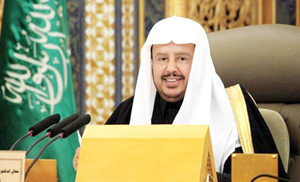Riyadh, Jun 27: Shoura Council Speaker Abdullah Al-Asheikh said the Kingdom has placed serving pilgrims among its top priorities.
In remarks on the occasion of Eid Al-Fitr carried by the Saudi Press Agency (SPA), Al-Asheikh said serving the guests of Allah rests on the Kingdom’s deep belief that it is an honor and responsibility it has pledged to bear in the quest for reward from Allah Almighty.
In this context, the Shoura speaker congratulated the leadership on the success of the Umrah season during the holy month of Ramadan thanks to construction work carried out in the two holy mosques with a view to raising their capacities and facilitating services to the guests of Allah.
Meanwhile, Umrah performers condemned the attempted terror act targeting the Grand Mosque, saying this heinous act is nothing to do with the true Islamic religion and its tolerant principles.
Speaking to local press, Mohammed Abbad, a Tunisian, said Allah has given the Kingdom wise leadership and vigilant security men in a manner that has allowed Umrah performers to peacefully conduct their rituals. He said this group of terrorists has lost their humanity in their attempt to target the sacred house of Allah.
Search
Serving pilgrims Kingdom’s top priority: Shoura speaker
Arab News
June 27, 2017





Comments
Add new comment